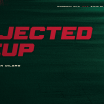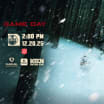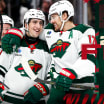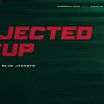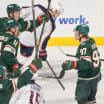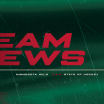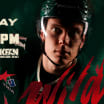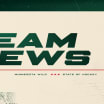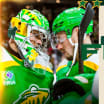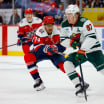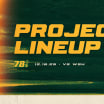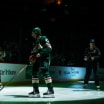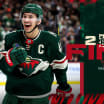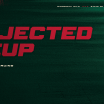With just over seven weeks remaining in the offseason, Wild.com's Dan Myers will catch up with all three head coaches in the Wild organization. Today, he chatted with Minnetonka native Steve Martinson, the head coach of the Allen Americans, Minnesota's affiliate in the ECHL.
Still to come are conversations with Iowa head coach Tim Army and Minnesota bench boss Bruce Boudreau.
Martinson, who will embark on his eighth season as coach and general manager of the Americans this fall, played 14 seasons professionally before entering the coaching ranks. This year will mark his 24th behind the bench. In March, Martinson became just the third coach in the history of pro hockey to surpass 1,000 career victories.
Catching up with coach: Checking in with Steve Martinson
As part of a week-long series, Wild.com's Dan Myers will visit with each of the three head coaches in the Wild organization
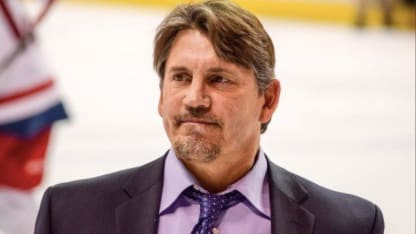
By
Dan Myers
Wild.com
Dan Myers: You played college hockey at St. Cloud State back in its Division II days. How did you go from Minnetonka, to SCSU and then on to the professional ranks? It certainly seems like a non-traditional route back then.
Steve Martinson: I was a real late bloomer. I was 5-foot-2 in 10th grade and I broke my arm my senior year, so I didn't have much of a high-school career, not like a normal Minnesota high school kid. I went to St. Cloud and I matured late; I got a lot bigger when I was in college.
When I was a junior, I think I was one of the top goal scorers for Division II. That year, a Minnesota [North Stars] scout came out and watched a game and I got recommended. I went to their camp and I had only three days of meal money. All the University of Minnesota kids had six, seven days of meal money, so I knew I didn't have much time to make myself known.
DM: You racked up nearly 2,800 penalty minutes during your playing career and fought some of the toughest men to ever play the game. When did it become clear to you that if you were going to stick in pro hockey, you'd maybe have to do it playing a hard game and being one that was a defender of teammates?
SM: It really wasn't like that for me. When I came in, I used to fight a lot. I used to fight a lot when I was a bouncer and I used to do a lot of street fighting, so it wasn't like I came in and [realized that's how I would have to play]. I came in like that already. I probably did it too much. One time, John Mariucci came to watch me play [in the IHL] and he told me to stop fighting so much. He told me, 'You're a pretty good player, don't fight so much,' so I cut back a little bit. Then [the North Stars] called me up to their affiliate in Birmingham.
But I liked fighting. I liked to play hockey. I had a coach once who told me, 'You have a short fuse and that can make you a lot of money in this game.'
DM: Looking at your playing career, you played all over the country (15 different teams in 14 seasons). What was it like moving around that much during your playing days?
SM: The way I look at it now is, I got to play for a lot of different coaches. And I was never planning on coaching, I had business degree and it never even entered my mind that I would get into coaching. It wasn't like I was studying the game, but I was just getting a lot of different philosophies and a lot of different ways that coaches approach things. That was the good thing about it. I played in some nice places and I played in some places that I didn't like.
I knew I could play, and some coaches would let me play and some only wanted me to fight. That was the frustrating part, was I knew I could play, but I wasn't getting much of an opportunity.
DM: Among your stops were Detroit and Montreal in the NHL, two of the Original Six franchises. What were those experiences like?
SM: I played my first NHL game with Detroit and it was against [Wayne] Gretzky, and I had Gretzky all lined up to hit him. I thought, 'This might be my only game.' I wasn't trying to cheap shot him, but I was trying to nail him, and I ended up getting in a fight right after that. It was cool. In Detroit, I remember fighting Dave Semenko and it was in front of like 20,000 people. It was like the old gladiator days.
DM: You said you didn't have your sights set on coaching during the early days of your playing career, but how did that opportunity eventually come up?
SM: When I finished playing, I was actually working for the guy who owned the team (the San Diego Gulls, then of the WCHL) in the summer time, selling furniture. I had done a lot of construction jobs too.
Then I got an offer from Smith Barney, a guy came in and recruited me to work with them. I ended up doing really well there and they put me in the Smith Barney training program, went to Wall Street. When I was done playing, within six months, I had my broker's license. I was working at Smith Barney when this guy wanted me to meet with him about doing roller hockey, he wanted me to coach the team in San Diego. I cold called him because I figured he had money and I was trying to convince him to open up an account, and he ended up asking me if I could coach roller hockey in the summer. So for awhile, I was doing both and then the new league (the WCHL) opened up in San Diego and Don Waddell was the GM of the team. Him and I had played together and offered me the [head coaching] job, and I figured I could always go back to Smith Barney. Well, now it's 23 years later.
DM: You've won 10 championships as a head coach. Have you ever had opportunities to move up to the AHL or even the NHL levels?
SM: What happened with me was ... when I was in San Diego, I was the part owner of the team and they gave me that ownership to stay. The biggest thing I can tell people is, I didn't not move up because I couldn't win. But I also didn't network at all. And we played a style where were were offensive and entertaining but we were physical. I didn't play a style that made me popular with leagues. We were a penalized team, but we were offensive.
In my early days, I had to learn that not everything is a fight. I approached every argument like I wanted to win. And there is nothing worse than letting league officials know they are wrong, and you prove it. I didn't mind confrontation and I wanted to win every argument. I remember once, the owner of the team in San Diego, he'd tell me, 'Hey, look, Steve, sometimes you have to let them win some battles once in a while, otherwise all they do is resent you.'
DM: This past season, you became the third coach in the history of the sport to win 1,000 pro games, joining Scotty Bowman and John Brophy. What does that mean to you, being the winningest American-born coach in history?
SM: I'll be honest, I never think about it. I never think about, 'OK, I've got 1,000 wins,' all I think about is what I have to do to win the next game, what do we have to do to win this week, this month. My No. 1 thing is that, and that's what I'm always working on. I'm just working on getting another team that can win a championship.
DM: You had a ton of injuries last season down in Allen and had your first losing season as a head coach. How difficult was that to navigate as it was happening?
SM: It was tough. I pulled off a trade late in the year to bring in some guys and then we lost some of them to injury. Some years, it's just not in the cards. We lost six forwards the first two weeks of last season and five of them were counted on to score 20 goals or more for us. It was tough, it was a painful year but it was a learning thing. I try not to be too negative about it, but we ended up being a bad defensive team. The guys that we had that were good players, I replaced them with players who were bad defensively ... I spent so much time looking at video. It was painful, it was a long year, and I'm not bringing too many of those guys back, that's for sure.
DM: Last year was the first year Allen was affiliated with Minnesota after years of working with San Jose. What were some of the main things you noticed about that affiliation working with a new organization?
SM: The biggest thing was, I've known [Wild assistant GM Tom Kurvers] since we played. We met back when he was turning pro and he was up at a conditioning camp in Brainerd. That's when I met him and we've been friends ever since. To be able to work with people that, No. 1, when you work with an NHL team, they've gotta care about you too. It can't be only you caring about them. You want to make sure that your affiliate cares about you and one of the big things is getting enough players so that you're protected from other AHL teams that don't sign a lot of players. The Chicago Wolves is one, Springfield is another ... they have a couple of injuries and they just start going through ECHL rosters. If you have too many guys that are ready to play in the American League, you can [lose players quick].
Tim Army has talked to players that we're recruiting as well, and that's something that is real beneficial. [The Wild] has also given me access to scouting reports, which I've never had before. I can look up players and get their agents and it cuts down a lot of work that I had to do when we were with San Jose. It was time consuming.
DM: How does the upcoming season look for you?
SM: We're still putting things together. I've got a couple of things that could be big if they happen the way I think. Tom and Tim and I have been on the phone a lot here the last week about depth players and [Iowa] making offers and seeing who shakes out as to who will be the depth guys, who will be their call ups.


